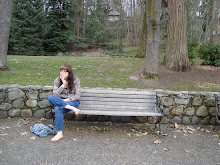
I enjoyed reading his poems. The poems are simple and to the point. For once, the poet is easy to understand. The other poets that I have read are hard to understand and William Carlos Williams was easy to read but had great ideas for poems. There was a couple of the poems that stood out in my mind. The poem "The Young Housewife" was interesting with a little twist of voyeurism. The beginning of the poem Williams describes a housewife moving about in her house in a neglige. He is watching this woman outside in his car. I got the impression that Williams has done this before. He has watched this woman from the outside before. The most beautiful line in the poem is in the middle of the poem: "shy, uncorseted, tucking in stray ends of hair, and I compare to a fallen leaf". The image of a "fallen" woman in a nightie outside waiting for her husband is just a wonderful image. I can see her as a once beautiful woman but was tied down to one man and her looks have gone away with love. The outsider (William Carlos Williams) still sees her as a beautiful woman. He sees her as a beautiful woman even with the flaws she has. One of his more simple poems "This is just to say" has a sweet beginning and ending. The poem is about William Carlos Williams eating a plum in an icebox and he is apologizing for eating the plum. Even though the words are not very "poetic" there is still beauty in the way he expresses his words. Eating the plums were delicious but his sorrow for eating the plums was eating away at him. He explains he loves the taste of the plums and he could not help himself. For some reason, his honesty really caught my attention. Another great poem from William Carlos Williams is "The Farmer". I could clearly see the image of the farmer wanting his garden to grow. One of my favorite lines in the poem is in the beginning: "The farmer in deep thought is pacing through the rain among his blank fields, with hands in pockets in his head the harvest already planted". The word that stood out was blank. The farmer obviously pacing back and forth with anticipation for the growth of his field. Blank could also be for his field or also for his expression. The image of a farmer waiting for the plants to grow shows a lot of blank expressions. The initial wait is killing the farmer. Williams has great description of nature through out his poem: "A cold wind ruffles the water among the browned weeds." So far, I have not heard a poet use the word ruffles before in a poem. The simplicity of the poem with unconventional words makes this poem unique.
Reading more and more Gertrude Stein the more I understand the way she writes. A lot of the poems do not make much sense but the sound of the poems are marvelous. She repeats a lot of words which makes it hard to understand. I had to read the poems out loud to get the full effect of the sound. One of the poems that I liked was "George Hugnet". One of my favorite lines in the poem is in stanza 5 line 7: "With out whether it their whether with out doubt." The line sounds so beautiful. The alliteration with the "w"s makes the line stand out. The initial word hiccup "doubt" works with the line because it abruptly ends with an unfamiliar word. The rest of the line matches well with sound but Stein likes to leave her audience with wanting more. Another great line in the poem is in stanza line 13: "George Genevieve Geronimo straightened it out without their finding it out." It is hard to describe because I do not know to much about Stein but I know from reading this one line that she knows how to rhyme and use alteration. What is George Geronimo straightening out? The more I read into the poem I have several ideas. Is grammar really grammar or does grammar have another special meaning. There is this underlyning assumption from Stein that the audience already knows what "it" is. The audience already knows what grammar is. I would like to know more about her real meaning is.

No comments:
Post a Comment